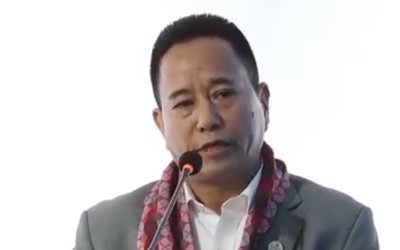More on News





U.S. Ambassador to Nepal Peter W. Bodde visited Ranidevi Lower Secondary School in Ranibari to observe how U.S.-funded Temporary Learning Centers (TLC) provide safe learning spaces for Nepali youth and educators. Ambassador Bodde spoke with the school staff, teachers, and visited each public school classroom to greet students.
The United States and UNICEF are working together with local partners to support the education sector in response to the earthquake. In consultations with the Government of Nepal’s Ministry of Education, USAID will invest $5.1 million to establish more than 1,000 temporary learning centers (TLCs) in the most affected districts to restore access to education as quickly as possible, standing up about 10 TLCs per day.
To date, more than 1,300 TLCs are already operating at public schools, and another 3,200 will be established in the coming weeks in the 14 most-affected districts. These structures are built using material indigenous to Nepal, such as bamboo, and incorporate durable tarp and corrugated iron sheets to protect from rain and wind. Most two-room TLCs accommodate about 120 students during a double-shift school day. These TLC structures can last one to two years.
According to a press release issued by Public Affairs Section, Embassy of The United State, with the United States’ support in the education sector, more than 148,000 children can access safe TLCs, and almost 195,500 children can be provided with learning materials and school supplies.
Ambassador Bodde lauded the educators and students for their efforts to continue the learning process, saying “Seeing the resilience of Nepali youth and the commitment of Nepali educators here at Ranidevi School gives us an excellent example of what Americans and Nepalis can achieve together as we build back better.”
USAID is actively coordinating with the UN-led humanitarian education emergency response, which aims to reach at least one million children in the earthquake-affected districts through TLCs, and by providing learning and recreational activities, emergency supplies, and psychosocial support to teachers.




